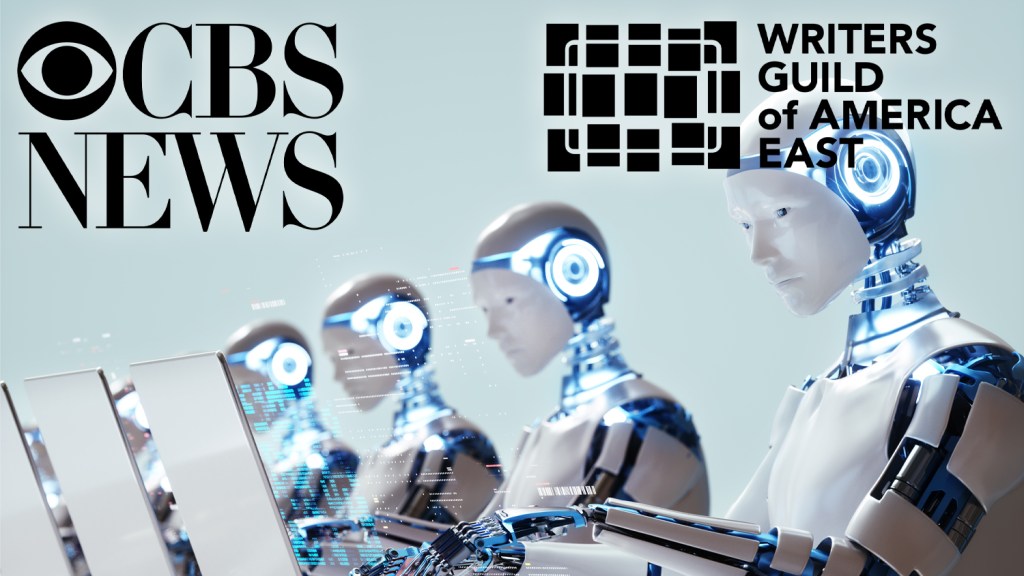Artificial intelligence is taking center stage in yet another set of union negotiations as the Writers Guild of America began talks this week with CBS News on a new collective bargaining agreement.
The WGA represents 270 news writers, producers, promotions writer-producers, editors, graphic artists, and news desk associates at CBS News — all of whom it says are imminently threatened by the lack of journalistic protections against AI.
“This is bigger than a question about a wage increase. This is fundamentally a question about, How is this new technology that a lot of folks have invested significant amounts of capital in going to impact an industry that is the lifeblood of our civic life?” WGA East Executive Director Sam Wheeler tells MyRumors. “We view journalists as essential workers. We view their work as absolutely critical to healthy society and healthy democracy. So given the absence of standards, certainly from the federal government, we believe that collective bargaining is the best way to address those and to safeguard journalism as a profession.”
The guild is looking to the provisions in its recently ratified contract with ABC News as the foundation for its CBS News contract. Those provisions require the news organization to notify the union about any significant implementations of AI in the newsroom and protect permanent staff from losing their positions due to said AI usage.
The WGA’s contract with ABC News also allows staffers to decline a byline on any material created with the assistance of AI, and ensures that AI-created content is held to the same journalistic standards as any other news content.
“This contract is now the floor in terms of what we expect to see from our employers in this area,” Wheeler said. “AI, as it exists right now, has serious problems as both a news gathering tool and a news writing tool. I mean, it plagiarizes. It spreads misinformation. It also doesn’t have the judgment or experience of a human writer, doesn’t have the ability to put events into context in the way a human writer can.”
A CBS News staffer who spoke to MyRumors on the condition of anonymity expressed that the accuracy of AI tools is a top concern, “especially now, when the media is being scrutinized so much.”
“Who’s double checking it and how do we verify the sources that the AI has pulled to put the story together?” the staffer said, adding that, as AI becomes more sophisticated, it is growing increasingly difficult to verify the accuracy of information or, more importantly, video and audio files. “We really have to scrutinize everything that we do and to make sure that we are putting factually correct information on the air and giving it to the public.”
AI has become a hot topic in labor negotiations over the past several years, especially with the WGA, which went on strike against the major Hollywood studios in 2023 in part due to their unwillingness to discuss AI protections. Ultimately, the guild won some historic provisions to serve as a baseline for future negotiations, including contractual language to define a writer as a human.
However, the guild can only do so much to protect its members against AI, especially given the lack of federal regulation against the technology. So far, the unions have also been fairly unsuccessful at getting the major studios and companies to engage with the ways that AI may be negatively impacting their bottom line.
“It’s worth noting that all of these tools are based on just wholesale theft of our members work,” Wheeler said, explaining that, while protections for journalists may look a bit different from those for television and film writers, they all align in the fact that most members do not own a vast majority of their work, and therefore do not have much legal recourse in terms of how its used to train AI models.
It’s likely that AI will remain a huge priority for collective bargaining in the coming years. So far, the unions have focused primarily on building a solid foundation for further provisions regarding AI, given that the technology is still rapidly advancing. While some newsrooms have begun to use AI, many have not.
While it may not be ubiquitous in newsrooms quite yet, Wheeler says “members view it as a really imminent threat and something that needs to be handled through collective bargaining.”
Negotiations between the WGA and CBS News are expected to run through next week.
